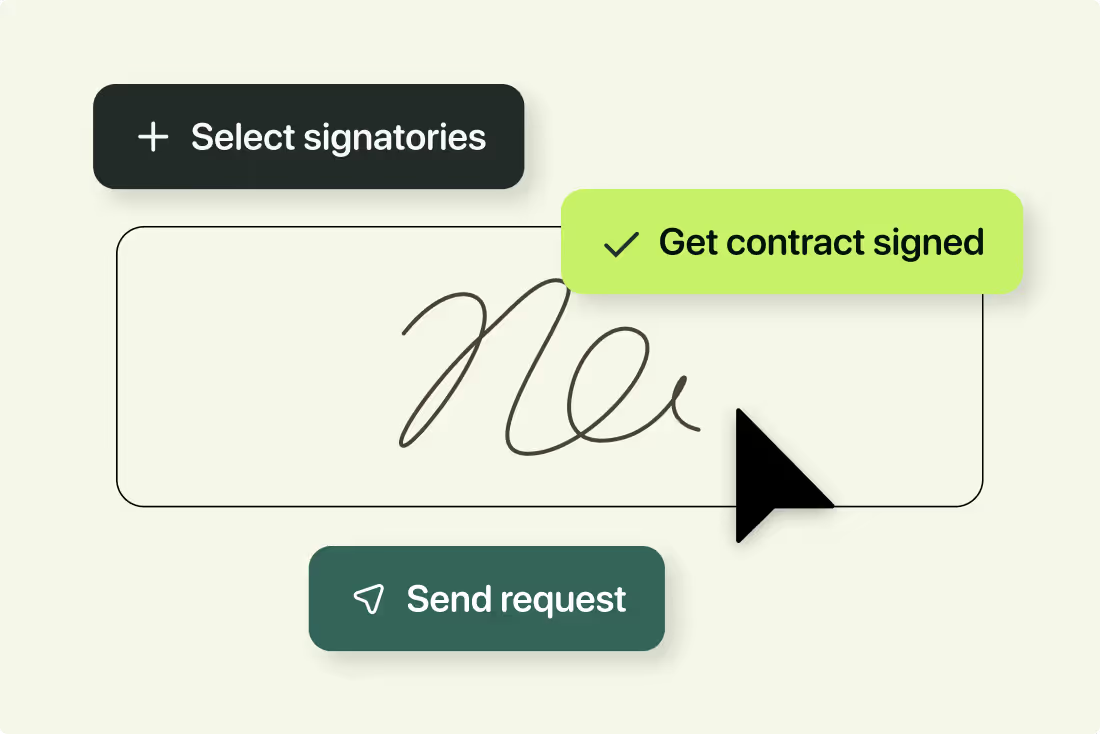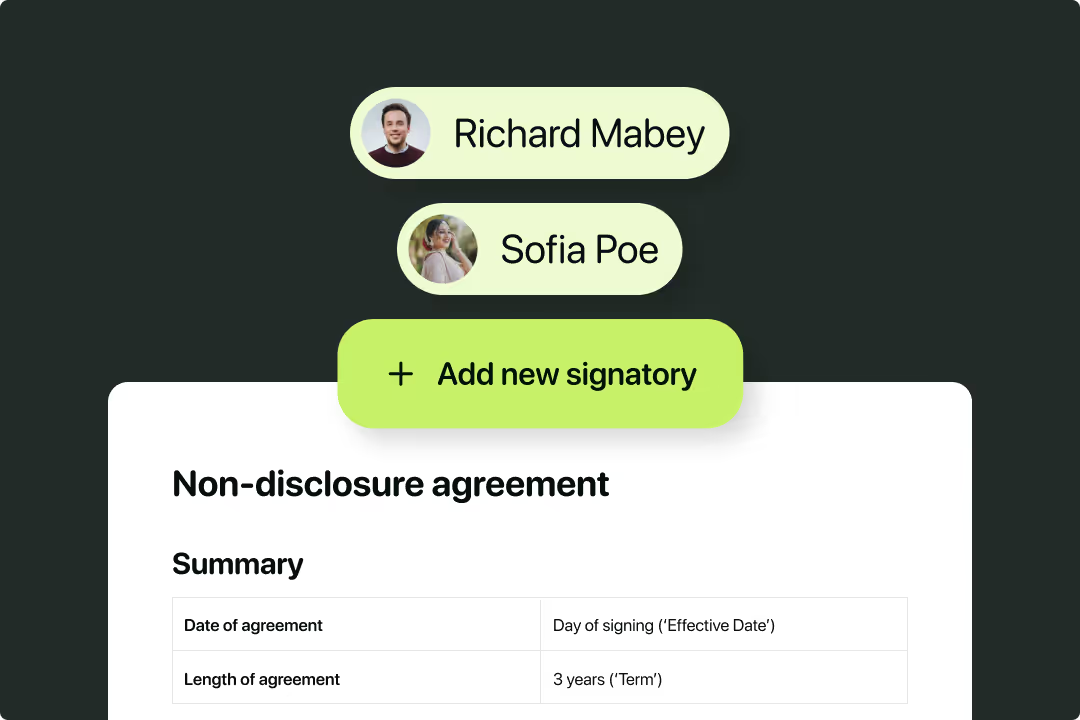Solutions
Customer Support
Resources
When you create a contract, the last thing on your mind is ending it.
However, not all contracts will stand the test of time. Contracts break down for a variety of reasons, and this often results in a contract being terminated.
But what actually happens when you terminate a contract, and when can you do it? Let’s find out.
Contract termination is the process of ending a contract before the obligations within it have been fulfilled by all parties. This means that one or more parties have made the decision to conclude the contract earlier than they had originally agreed when drafting and signing it.
If a contract is terminated, all parties will be freed from their responsibilities and obligations. This is also known as discharging a contract.
When entering into a contract, you might not be giving too much thought to it ending prematurely. But it happens. In fact, there are a few common reasons to terminate a contract. We’ve covered a few examples below.
One of the most common reasons for contract termination is when one of the parties to the contract has breached the contract. This happens when a party has failed to fulfill their obligations or has acted in a way that was inconsistent with the rules set out by the contract or agreement.
When this happens, the non-breaching party is entitled to terminate the contract and free themselves from their obligations within it.
Importantly, this doesn’t mean that the breaching party can escape the contract scot-free. The party that breached the contract may still be required to pay damages or compensate the counterparty for the losses they suffered as a result of their breach. It just gives the other party the opportunity to end the contractual relationship earlier than originally agreed.

Parties will also be forced to terminate a contract if the performance of that contract has become impossible since it was agreed. This happens when a supervening event occurs which makes fulfilling the obligations in the contract impossible, or illegal.
Imagine, for example, that you create a contract. The obligations within this contract were perfectly legal when the contract was drafted and signed. However, after it became effective, a law was introduced which meant the obligations that the parties had to fulfill became illegal.
To avoid landing themselves in hot water with the law, the parties could choose to terminate the contract and get rid of these responsibilities altogether. This is different from a breach of contract since the parties are left with no choice but not to perform their contractual duties.
It’s also possible to terminate a contract simply because the parties aren’t receiving value from it and wish for it to end early as a result. This can also happen if the parties find it difficult to work together.
However, all parties to the contract must come to a mutual agreement that they want the contract to be terminated in this case.
This is something that happens with employment contracts, for example. If an employer and an employee both agree that a job isn’t working out or is a bad fit, they can agree to end it. This can happen even if they’re employed under a fixed-term contract that hasn’t ended yet. (You might need an employment termination agreement template to do this).
Terminating a contract in this way ensures that both parties can do what’s best for them without being penalized for this. A mutual release agreement template will be a strong starting point in most cases.

Interestingly, the reason behind the decision to terminate a contract can determine how the contract termination happens. Broadly speaking, there are two types of contract termination: termination for cause and termination for convenience. Let’s explore these together now.
Termination for cause occurs when a party’s actions or inactions cause the contract to break down. This could be because they’ve failed or refused to perform their contractual obligations and breached the contract, for example.
Most contracts will include a termination for cause clause that describes when one party will be able to terminate the contract without the explicit consent of the other.
Termination for convenience, on the other hand, enables parties to terminate the contract without needing to prove blame or breach. This type of contract termination is used to end relationships more amicably and exit contracts that no longer benefit either of the parties involved.
Importantly, if parties wish to terminate the contract for convenience, they usually have to have included a clause within the contract itself that allows for this.
For example, some contracts contain a clause that says that a contract can be terminated at any point so long as the 30-day notice period has been met. This means that parties can end the contract without any cause.
To recap: we’ve discussed what contract termination is, when you would terminate a contract, and what the two different types of termination are. But we haven’t explored how you actually terminate a contract in the first place. Let’s do that now.
Before you express your intention to terminate a contract, you first need to know whether or not you have grounds to.
This right to terminate a contract will usually be described within the contract itself. Most contracts will include clauses about specifically when a contract will be terminated, so it should be clear whether or not you have grounds for termination.
But there’s also a general right to terminate a contract if a breach of contract occurs. This rule exists under common law for repudiatory breaches. A repudiatory breach is a breach that’s so severe that it deprives the contract of its original purpose.
If you’re still unsure about your termination rights, discuss your situation with a lawyer or attorney to receive an expert opinion. If you’re lucky enough to have a legal team in-house, even better.
If you do believe that you have grounds to terminate your contract, you next need to provide notice of your decision to terminate the contract. Regardless of what your grounds are, notice is required to terminate any contract.
Typically, this notice will come in the form of a written document that clearly explains your decision to terminate the contract, why you wish to do so, and on what grounds. It’s common for the notice to also cover when the contract will be terminated by and which process will be followed.

If there was a major breach of contract, the termination notice will also need to explain what this breach is and that it was so severe that it couldn’t be resolved. It will also need to discuss which damages are available due to the breach and how these will be awarded.
But not all termination notices look the same. Many professionally drafted contracts will provide specific details about what this termination notice should look like and include. The original contract could provide a specific notice period and even explain to whom the notice must be addressed.
That’s why parties should always refer to their original contract when deciding how to deliver this notice, and what it should cover.
Use this free termination agreement template to get started.
Once drafted, you need to actually deliver your termination of contract notice. As we just mentioned, most contracts will describe exactly how this notice should be served and who it needs to be served to.
It’s important to follow these instructions to ensure you terminate your contract correctly. If not, you may find yourself in trouble for improper contract termination. But we’ll cover that more in a moment.
If you are successful in terminating your contract, all parties will be released from their remaining contractual obligations.
If the termination was as a result of a severe breach, the breaching party may even need to provide the other party with certain remedies for the termination and breach. This can involve anything from damages to injunctions.
If you attempt to terminate a contract without sufficient grounds to do so, or you terminate it incorrectly, you could find yourself in trouble for wrongful termination. This means that the counterparty might be able to make a claim against you instead.
This is something that’s worth considering before jumping into contract termination when the counterparty makes a minor breach of the contract. In most cases, the breach will need to be substantial to terminate the contract. If it isn’t, you’ll be unable to terminate the contract lawfully.

Contract termination can be complex and frustrating for the parties involved, particularly when both parties want different things. It’s far better to create more robust contracts from the outset and ensure that you manage your contractual obligations properly. That way, contract termination won’t be necessary.
But managing contracts is hard work for fast-growing businesses with lean legal teams. In fact, they often face the same problems:
Fortunately, businesses can transform their contract workflow using contract management software. All-in-one contract tools like Juro enable all teams to streamline the creation, execution and management of routine contracts at scale.
Juro users can:

To find out more about how Juro can reduce contract admin and streamline your contract workflow, fill in the form below to speak with one of our specialists.

Lorem ipsum dolor sit amet, consectetur adipiscing elit. Suspendisse varius enim in eros elementum tristique. Duis cursus, mi quis viverra ornare, eros dolor interdum nulla, ut commodo diam libero vitae erat. Aenean faucibus nibh et justo cursus id rutrum lorem imperdiet. Nunc ut sem vitae risus tristique posuere.

